Complimentary worldwide shipping on orders over $400 · No import tariffs for most countries
Complimentary worldwide shipping on orders over $400 · No import tariffs for most countries
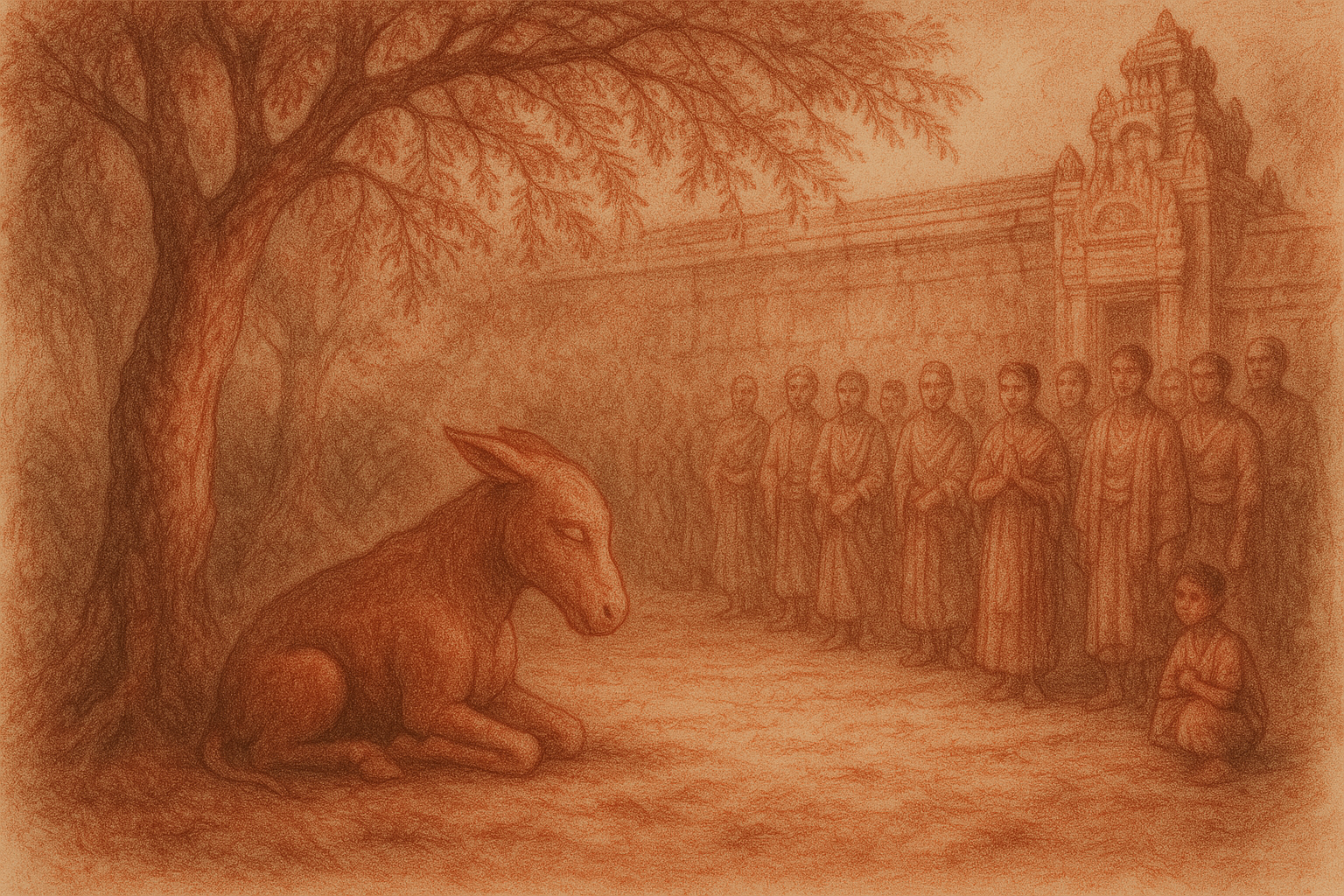
The Wise Donkey and the Drunken Merchant
A tale of stillness mistaken for depth, and noise mistaken for truth
Not all who sit in silence are wise—
but the wise are often silent.
—
There once was a merchant who wore his arrogance like a sacred thread.
He had travelled far—not for truth, but for trade—and returned to his homeland with a purse grown fat and a belly fuller still. The road had not made him holy, only clever. And cleverness, drunk on itself, often dresses as wisdom and calls itself divine.
So it was that he came to the village of Srey Lok, clothed in saffron robes he had never earned, holding a beggar’s bowl he had never emptied. His voice rang through the morning like a cracked bell: full of sound, but hollow at its core.
“I have returned from distant lands!” he cried, standing atop an overturned basket in the temple courtyard. “I have sat beneath sacred fig trees and spoken with hermits who drink only dew. I know the secret to ending suffering!”

He raised his arms as if parting clouds. “And now I shall teach it—to all of you.”
The villagers, gentle as ricefields, gathered to listen. They bowed. They murmured. They tried to understand. But the merchant’s teachings wound like overgrown vines—sentences with no root, parables with no fruit. Still, he wore the right cloth and spoke the right words. And in this world, such things matter more than they should.
Outside the temple wall, tethered in the shade of a tamarind tree, stood his donkey.
It was old. Its legs bowed with age, its tail sparse, its back curved from years of carrying burdens too heavy and masters too vain. It stood in the dust without complaint, as it had done in every village before this one.
But the sun was hot that day. The sermon dragged long. The donkey’s bones ached from stillness.
So the donkey knelt.

Not with drama. Not with show. It simply folded its weary legs and settled into the warm earth, lowering its heavy head as though exhaling into silence.
A child saw it first.
“Look!” he whispered. “The donkey is meditating.”
His sister giggled. “Like the hermit statues in the eastern shrine.”
An elder adjusted his shawl and squinted. “It does seem... serene.”
Others turned. The donkey, unaware of their gaze, closed its eyes. A fly landed on its ear; it twitched once, softly. Someone gasped.
“It does not stir! Such stillness.”
“Such depth of presence.”
By the time the merchant had completed his discourse on the seven levels of celestial thought (all invented between sips of rice wine), half the crowd had wandered away. He stepped down, flushed with the heat of his own sermon, only to find his listeners gathered in quiet devotion—not before the shrine, but around his donkey.
“What are you doing?” he demanded.
A young woman murmured, “The donkey teaches with its silence.”
The merchant scoffed. “It’s an animal!”
The village priest folded his arms. “And yet it does not lie.”
The merchant’s face darkened like the edge of dusk. “Fools! It’s not holy—it’s lazy!”
Just then, the donkey stirred. It stretched its long ears… and let out a bray that rolled slowly through the courtyard, deep and sonorous as a temple gong.
“A mantra,” someone whispered.
The priest nodded. “A cry of compassion.”
The merchant flung down his bowl and stormed away, muttering curses no spirit would heed.
No one followed.
—
In the days that followed, the villagers began to sit beside the donkey in the afternoons. Some brought offerings—fresh-cut grass, a vessel of water. Others brought nothing but their stillness.
They sat in silence beneath the tamarind tree, listening not to sermons but to wind, leaf, breath, and presence.
No great truths were spoken.
But no lies were, either.
The donkey remained as it was—tired, patient, alive.
As for the merchant, he vanished down the road he came from. Some say he wandered into the forest and was mistaken for a monkey by the spirits. Others say he met a truly awakened one—and did not recognise it.
But those who remember the tale still say:
When a man claims wisdom, ask who taught him.
When a beast is silent, ask what it knows.
And if ever you find yourself in the temple courtyard of Srey Lok, look for the carving beneath the tamarind tree—weathered by wind, softened by time. A donkey, head bowed, eyes half closed. Beneath it, an inscription:

The teacher who asked for nothing,
and gave peace to all.
—
Let the reader pause here.
Let them wonder who the fool truly was.
Also in Library
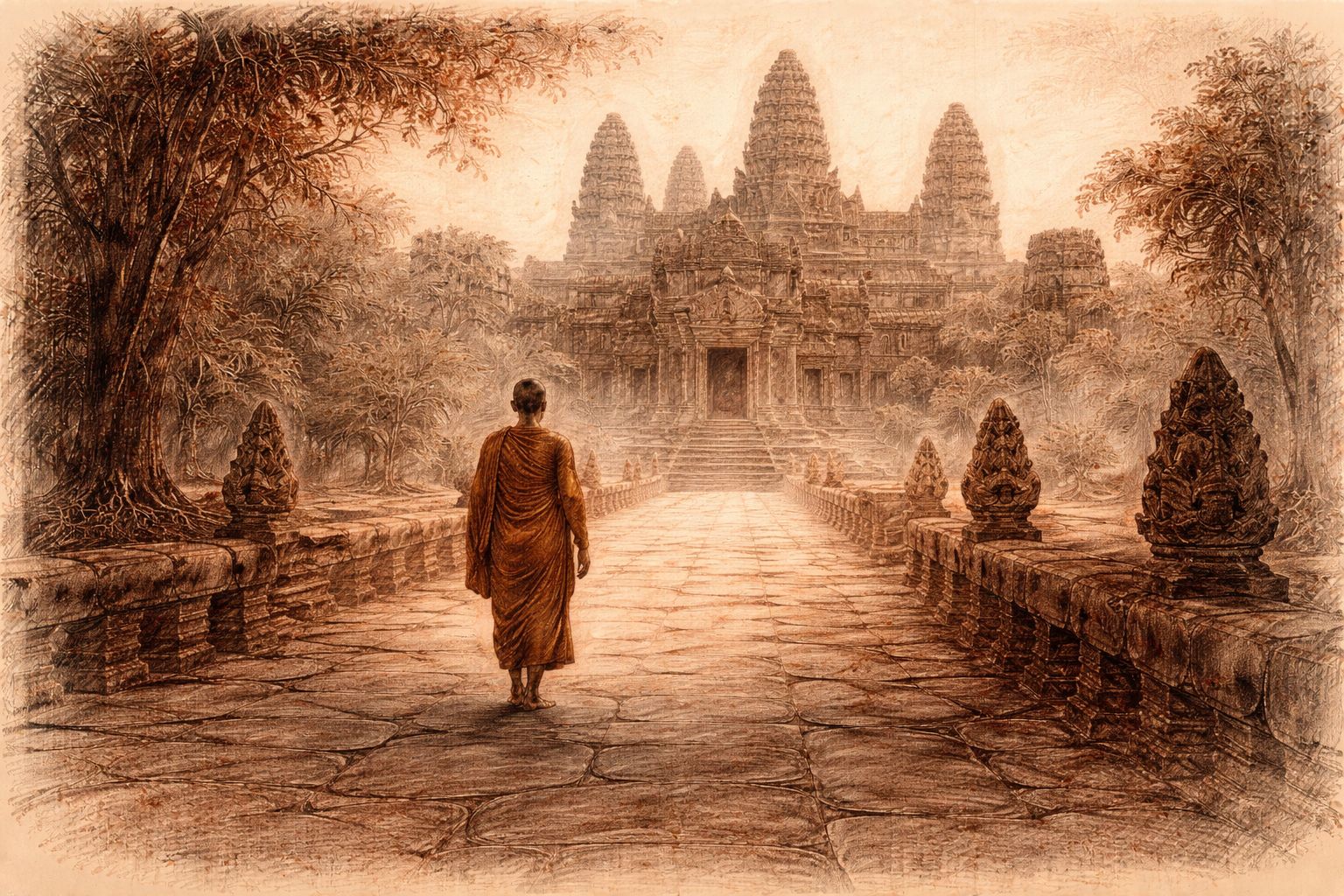
From Mountain to Monastery
2 min read
Angkor Wat survived by learning to change its posture. Built as a summit for gods and kings, it became a place of dwelling for monks and pilgrims. As belief shifted from ascent to practice, stone yielded to routine—and the mountain learned how to remain inhabited.
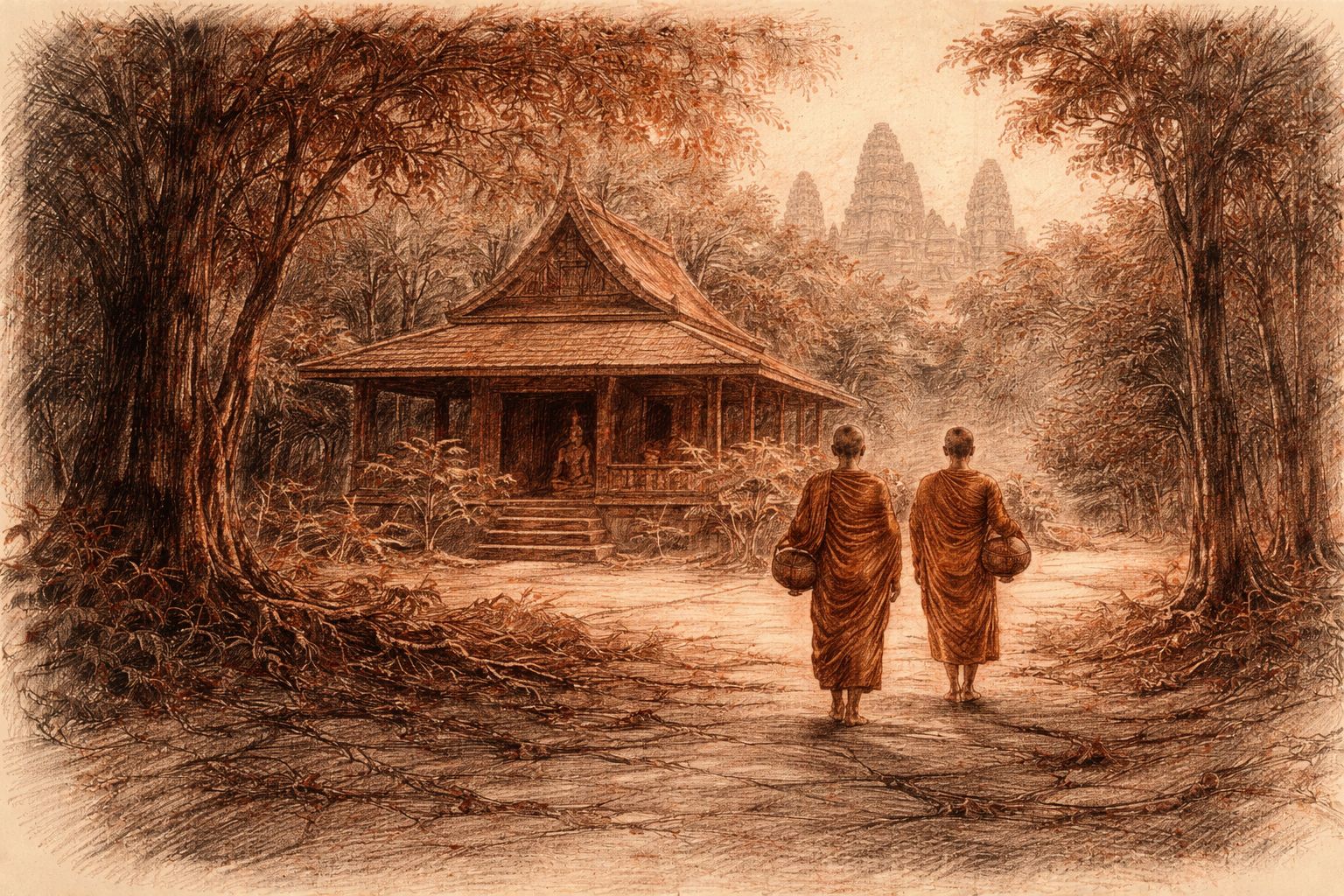
Why Theravada Could Outlast Stone
2 min read
Theravada endured by refusing monumentality. It shifted belief from stone to practice, from kings to villages, from permanence to repetition. What it preserved was not form but rhythm—robes, bowls, chants, and lives lived close together—allowing faith to travel when capitals fell and temples emptied.
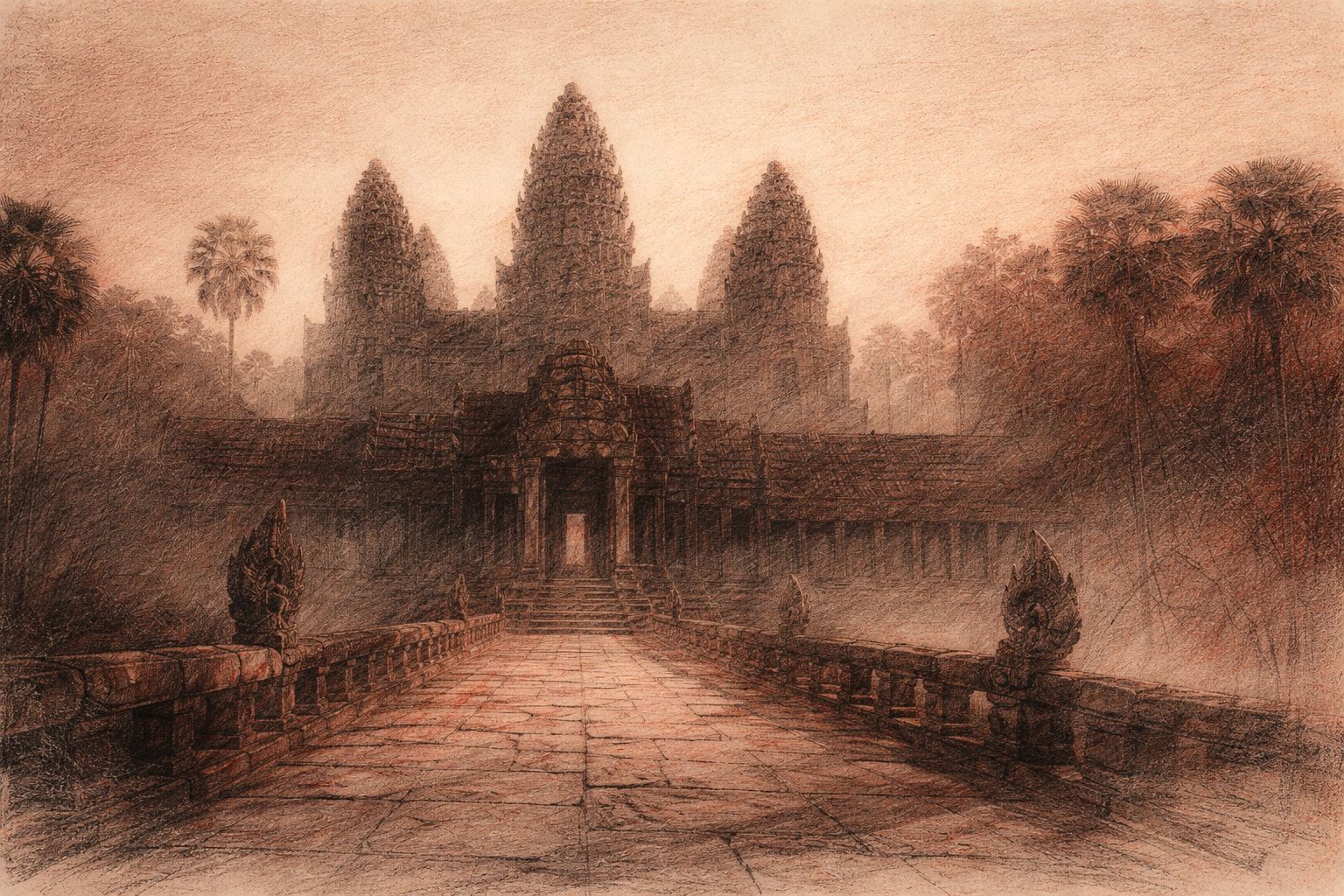
The End of Sanskrit at Angkor
2 min read
The final Sanskrit inscription at Angkor does not announce an ending. It simply speaks once more, with elegance and certainty, into a world that had begun to listen differently. Its silence afterward marks not collapse, but a quiet transfer of meaning—from stone and proclamation to practice, breath, and impermanence.
Join My Studio Journal
Receive occasional letters from my studio in Siem Reap—offering a glimpse into my creative process, early access to new fine art prints, field notes from the temples of Angkor, exhibition announcements, and reflections on beauty, impermanence, and the spirit of place.
No noise. No clutter. Just quiet inspiration, delivered gently.
Subscribe and stay connected to the unfolding story.
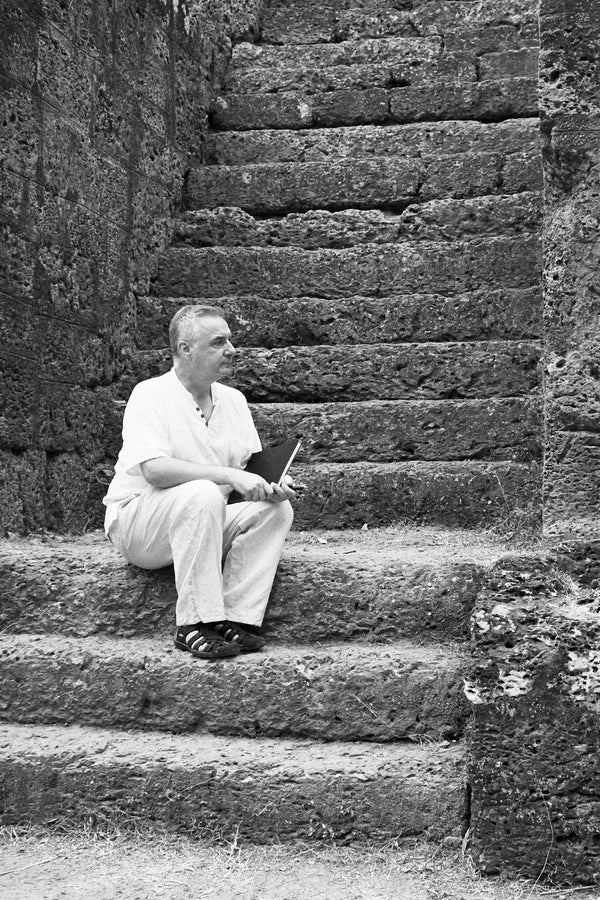
Join My Studio Journal
Receive occasional letters from my studio in Siem Reap—offering a glimpse into my creative process, early access to new fine art prints, field notes from the temples of Angkor, exhibition announcements, and reflections on beauty, impermanence, and the spirit of place.
No noise. No clutter. Just quiet inspiration, delivered gently.
Subscribe and stay connected to the unfolding story.
